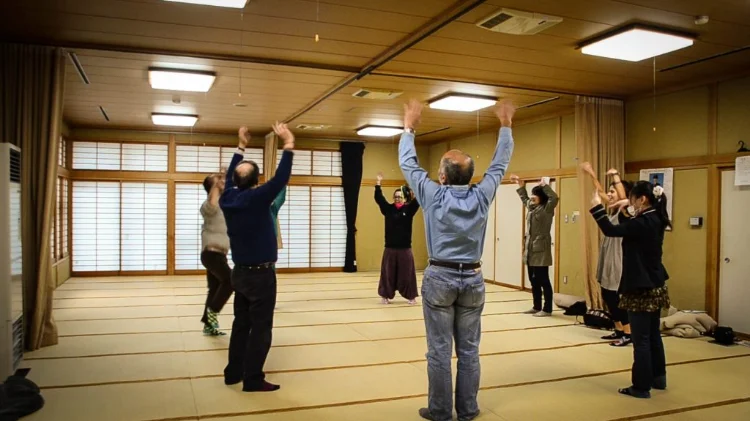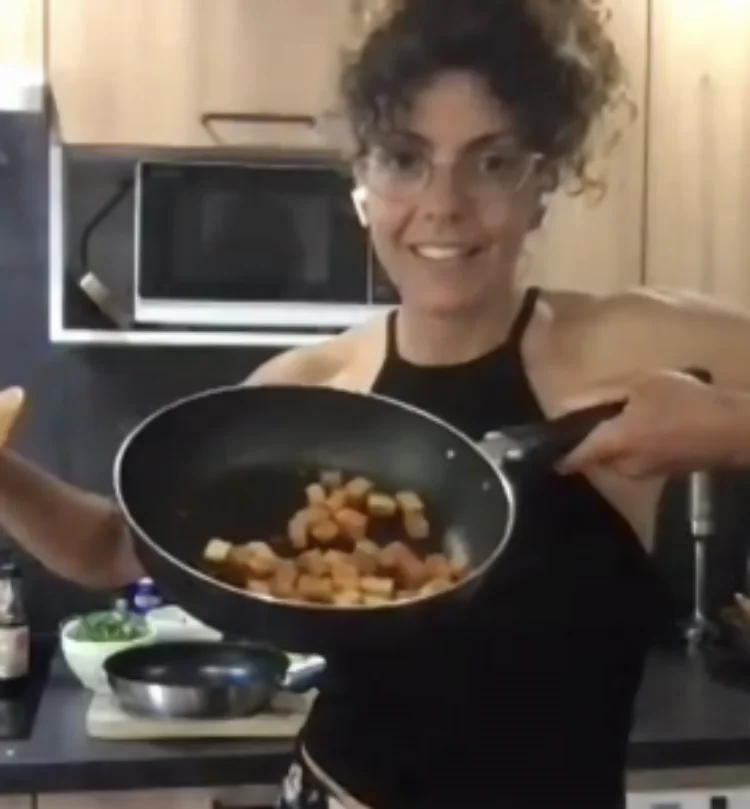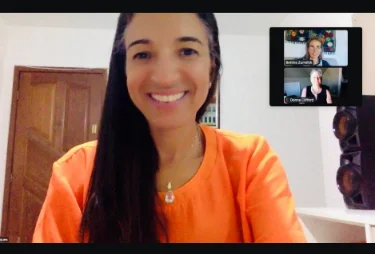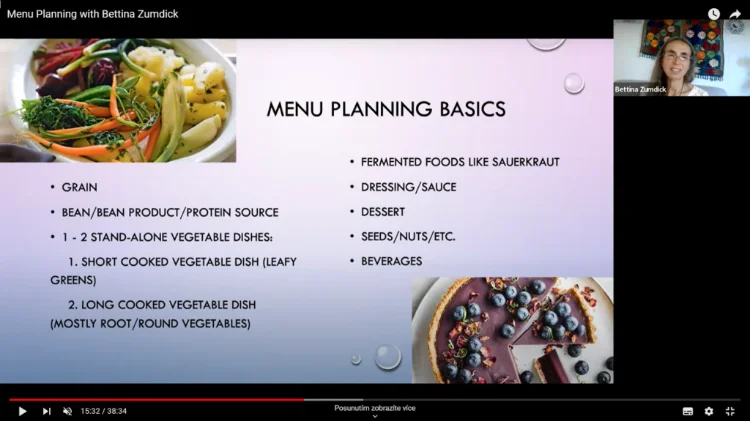
“If you go to Mars in a titanium tube, you’ve lost the script,” declared John D. Liu, an award-winning film director and ecologist in a keynote address on “Restoring the Planet” at the Macrobiotic Summer Conference in late July. “We need to restore the Earth, not Mars. We need full employment and food security for everyone. Twenty past civilizations have destroyed their ecosystems.” Ours will be the twenty-first and last, he warned, unless we learn to change and renew our oxygen, freshwater system, and soil fertility.
In his stunning film presentation, Liu showed that terracing, organic farming, and resilient irrigation techniques in China, the Middle East, and elsewhere have restored arid farmland, parched deserts, and other degraded regions and caused them to flourish. “I had really not known that such things were even possible,” marveled Elizabeth Moreland, echoing the astonishment of many participants. “His presentation filled me with hope for the future. It is important because it is so easy to feel overwhelmed by all the destruction.”
Another highlight of the annual gathering, held online for the third year because of the pandemic, was William Spear’s keynote on “Making Lemonade” and acceptance speech on “Gratitude” upon receiving the annual Michio Kushi Peace Prize for his out-standing lifetime contribution to health, peace, and sustainability. William, a longtime macrobiotic teacher and counselor, founded Fortunate Blessings Foundation that works with children traumatized by tsunami, cyclone, war, nuclear accidents, and other catastrophes.
The underlying common factor among adult and children trauma victims, William explained, was losing control over one’s life. To reach youngsters suffering from PTSD, play therapy has proved helpful. He told how he and his son Jonah worked with survivors of the Sandy Hook school massacre in his home state of Connecticut who were suffering “unfathomable terror.”

“A teacher brought her dog, and the dog jumped into the center of the group, wagging its tail,” he related. “Jonah barked at the dog, and the dog barked back. This led to a 10-minute barkathon in which every-one licked each other spontaneously and began to lighten up. The next week, the teachers said the children were different and had let go. It’s a somatic process. The trauma is still in your tissues.”
Mina Dobic, the other Kushi Peace Prize recipient, could not attend the ceremony because of a family emergency. Instead, an excerpt was read from her memoir My Beautiful Life about her first consultation with Michio Kushi. After healing herself of ovarian cancer that had spread to her liver, bones, and lymph system, she became a macrobiotic teacher, counselor, and chef. Over the last thirty years, she has helped thousands of people in her native Serbia and new home in Southern California.
At a forum on Planetary Health, former Kushi Peace Prize recipients spoke on their latest insights. Neal Barnard, M.D., director of Physicians Committee for Responsible Medicine in Washington, D.C., noted new medical studies show that people eating a plant-based diet are less apt to get Covid. Describing how we are making war with the water, air, and soil, Bill Tara, co-director of the Human Ecology Project in London, offered simple, practical steps for making peace with the environment. Jane Stanchich noted that anti-depressants are the #1 medication for children today and called for healthy, natural foods to be introduced instead. Her husband, Lino, also a longtime teacher and counselor based in Asheville, N.C., slightly hurt himself that morning hiking and was unable to attend. Virginia Harper, who healed herself of Crohn’s disease and now assists people from her center in Nashville, described how health and peace spiral from the individual to the community.

In his keynote “I’m a Tinfoil Hat, Bona Fide Conspiracy Theorist—or Am I?” Denny Waxman explored how common sense is a better touchstone for health and well-being than medical directives. He described how modern nutrition has failed to curb an epidemic of obesity in which two-thirds of adults and one-third of children are over-weight or obese. “Genetics leaves us feeling doomed,” Denny, founder of the Strengthening Health Institute in Philadelphia, went on. “We feel most problems are hereditary, and this leaves us with a sense of fear and helplessness.” Similarly, the germ theory of disease blaming invisible microbes for our ills creates hopeless-ness and defeatism. To recover our health, he concluded, spirit must guide technology. “We are self-healing beings on a self-healing planet.”
In other lectures, Susan Krieger, a macrobiotic counselor and acupuncturist in Florida, detailed key “spirit” and “ghost” points that can release long held traumas in the tissues and bring inner peace. For example, pressing Pericardium 7 on the wrist before the middle finger can release old pain when one feels spiritually empty or broken-hearted.
Bob Carr’s class on “Advanced Palm Diagnosis” examined what the shape, size, and condition of our hands show. He described how the hands develop in embryo and traced the correspondences between the life, intellect, and emotional lines with the digestive, nervous, and circulatory systems. He explained why there are two meridians on the little finger and big toe and how the Ki flow in the hands and feet are complementary opposite to each other. In another diagnosis talk, this writer analyzed the health and consciousness of world leaders using principles of Far East face-reading.

In his talk on “Living on Earth: Recollections of a Macrobiotic Meteorologist,” scientist Abraham Oort reflected on his early work on climate change at Princeton University and his later career as a shiatsu therapist at the Kushi Institute. His new memoir was just published by Planetary Health this summer and was part of a special set of books offered in the Summer Conference Auction.
Bettina Zumdick’s “Menu Planning” class surveyed the basic food categories, seasonal menus, and menus for use of leftovers. For example, the Autumn menu included Clear Broth Soup, Brown Rice with Blanched Soup, Peas, and Umeboshi, Root Vegetable Nishime with Fried Tempeh, Country Coleslaw, and Baked, Stuffed Apples. Christine von Dreien, a young Swiss woman, noted for her psychic insights, described her hopeful vision of the future.

International cooking classes constituted a major dimension of the conference, and chefs from Brazil, Russia, Portugal, Slovakia, and the United States featured healthful, traditional dishes. In one unique presentation, Danka Jack showed how to make tempura from nasturians, squash, and other edible flowers. “Danka’s class just made me so happy,” one participant enthused. “The whole idea of eating flowers was just magical. Somehow, I felt so lifted up, like a lovely summer day.” Mariya Ivanov, who has an organic farm in Russia, used veggies she grows in her recipes and showed slides of her family’s large garden.
In addition to her cooking class on “Tropical Colorful Rice,” Flor Marqez, a high-energy teacher from Brazil, led daily “Energetic Shift” classes. Born into a macrobiotic family, Flor went on to become a holistic dentist, completed counselor training at the Kushi Institute, and develop a unique approach to self-development combining macrobiotics, Reiki palm healing, and other integrative approaches.

Open Discussions, a vital part of the conference, allowed participants to meet, chat, and socialize during meal breaks. Hosted by Donna Clifford, R.N. and Mark Leonas, the discussions covered a wide range of subjects and were one of the most popular sessions. Larry and Judy MacKenney, counselors from Florida, hosted one session. Cynthia Vann, Amberwaves’ investigative reporter for EMFs gave an informative presentation on EMFs in one slot and Donna Krug, a University of Kansas instructor, talked about the different methods and benefits of fermentation at another. John Liebmann, a peace activist from Queens, gave a concise update on the United Nations Treaty for the Prohi-bition of Nuclear Weapons that went into effect earlier this year.
Following the Planetary Health Forum and Peace Prize Ceremony, the conference concluded with the skit, auction, and screening of the Spirit of Rice documentary. The skit, entitled “Happy Trails on Mount Macro,” followed intrepid hikers Jane Stanchich (Tree), Sheri DeMaris (Fire), Danka Jack (Soil), Cathy Albanese (Metal), and Donna Clifford (Water) along meridian trails to the earthly paradise. Lao Tzu (Alex Jack) supervised their ascent while working on an edition of the Digital Tao Te Ching:
The Tao that can be streamed
Is not the eternal Tao.
The link that can be clicked
Is not the eternal link.
The annual Summer Conference auction raised over $5000 for macrobiotic education. Items included packages of awned brown rice and Sufi sea salt, glutinous millet, and other specialty food items; beautiful watercolor note cards from Bettina; gift certificates from Eden Foods, Rhapsody Natural Foods, and Natural Import Company; and several online courses and consultations.

A memorial tribute was given to Rod House, an artist, chef, and original member of the Kushi Institute faculty. He passed away in July in his late 80s.
Overall, the conference was a great success. “My biggest takeaway was connecting with so many different people from around the world, like-minded organizations, and helpful little tidbits,” said Dolly Wolf from Delaware. “This was my first conference. I loved it! A nice mix of classes, presenters, and interaction,” enthused Karen Novek, a resident of Florida.
“The conference was educational, supportive, and helpful,” added Varya Simpson from the Bay Area in California. “I most appreciated the cooking classes and open-hearted interaction.” Perhaps Abraham Oort put it best: “The Conference created hope that the Earth and Humanity will survive and flourish.”
Alex Jack is president of Planetary Health and editor of Amberwaves. Reprinted from the autumn issue of Amberwaves, seasonal journal. To subscribe, click here.
